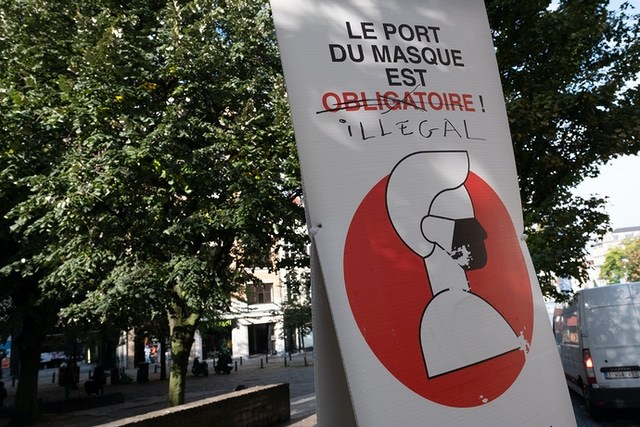The gap between the motivation of vaccinated and unvaccinated people to follow the coronavirus measures is widening, with the latter group increasingly unlikely to do so, a recent survey found.
Unvaccinated people who had previously been infected, in particular, are less motivated to follow the measures, as they assume that they have already built up sufficient immunity, according to the latest Motivation barometer report.
"In vaccinated people, there is a clear stabilisation of motivation, which is different for people who have not yet received the shot. In the case of non-vaccinated people, there is a decrease in motivation over time to adhere to the rules," lead researcher Maarten Vansteenkiste of UGent said.
In general, 35.96% of people were still highly motivated to follow the measures, in comparison with 29.93% in August 2020, an all-time low, when figures in Antwerp and Brussels were rising again.
Unvaccinated people, both those who have previously been infected and those who have not, are much more in favour of ignoring coronavirus measures than vaccinated people, among whom there is only limited support for the complete abolition of the measures.
Meanwhile, vaccinated people are in favour of a more relaxed behaviour towards other vaccinated people.
Among other measures to increase vaccination coverage rate in Belgium, the researchers recommend communicating more explicitly the effectiveness of vaccination, making clear its added value, even if people have been previously infected, and bringing the vaccine to the unvaccinated, as is already done in Brussels.
Extension of proof and mandatory vaccines
More than 7,000 people took part in the survey, in which researchers investigated public motivation for the coronavirus measures, the attitude towards the possible expansion of the Covid Safe Ticket, and what people in Belgium think about compulsory vaccination.
Non-vaccinated people are strongly opposed - almost 80% do not like the idea - to the extension of the use of the Covid-Safe Ticket (CST), which provides proof of full vaccination, a negative PCR test no more than 48 hours old, or a negative antigen test no more than 24 hours old, or a recovery certificate.
Related News
- Covid hospitalisations increasing, whilst deaths decrease
- End of Covid crisis management phase could be near, Vandenbroucke says
Vaccinated people, in comparison, are strong supporters of the extension of the CST (around eight in ten support it) so long as it is clear which groups and in which circumstances these methods can be used, rather than the general use of the CST.
In general, participants were most in favour of continuing to use the pass as it is used today, particularly for travelling or attending large-scale events. For nightlife too, 56% consider it a (very) desirable tool.
If the use of the CST is extended to smaller events, researchers stressed that it must be presented as a crucial instrument to ensure public safety and health and not as a way to convince people to get vaccinated; it must be framed as a temporary solution.
"Such framing ensures a more voluntary acceptance of these strategies and thus a smoother and more sustainable implementation," the survey read.
When it comes to mandatory vaccination, the highest percentage of participants supported compulsory vaccination for health workers (59%), followed by staff dealing with vulnerable groups (58%) and teachers (50%).
The researchers advised that mandatory vaccination, if implemented, should "frame the obligation of specific target groups as a logical consequence of the role and duties of health professionals to provide adequate care to our vulnerable."
"Against this backdrop, an obligation is not an imperative but a legitimate step towards regaining our collective protection and a more comfortable life," the survey read.
During Friday's Consultative Committee, both mandatory vaccination and the extension of the CST are expected to be on the agenda.

